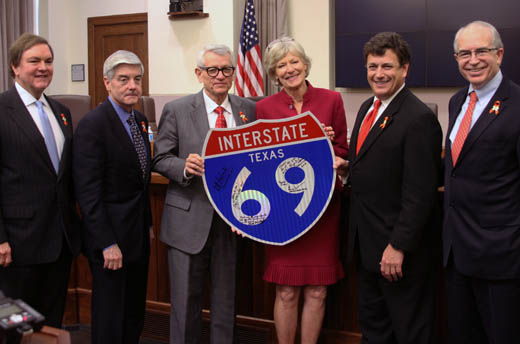• I-69 Implementation Strategy Taking Shape
An implementation strategy for continuing the development of Interstate 69 is in place and is being refined by the 10 TxDOT District offices responsible for various segments of the I-69 Texas System.
Judy Hawley, chairman of the I-69 Advisory Committee, provided members of the Texas Transportation Commission with an update on the implementation strategy during their December 2015 meeting. [Presentation Slides]
After the update transportation commissioners honored Hawley for her years of service in advancing Interstate 69. Hawley is a former member of the Texas Legislature, the outgoing chairman of the Port of Corpus Christi Authority Commission, a long-time officer of the Alliance for I-69 Texas and a Texas Road Hand Award recipient. She is stepping down from the Advisory Committee which she has lead since its inception in 2008.

Hawley is presented signed I-69 shield by Transportation Commissioners (l-r) J. Bruce Bugg, Jr, Victor Vandergriff, Chairman Tryon Lewis, Jeff Austin III and Jeff Moseley.
The implementation strategy will serve as a tool in planning and programming projects to advance I-69 and to coordinate their development within the TxDOT organization and among local community stakeholders.
I-69 in Texas is being developed as a series of dozens of incremental projects that will eventually be tied together in a seamless system. The implementation strategy includes a comprehensive database that will maintain and manage pertinent information and data for each I-69 project that is identified and is being tracked. An accompanying GIS dataset is being used to graphically display projects and their TxDOT programming status.
Earlier this year TxDOT Districts reviewed the compiled information and have been refining it to ensure that all I-69 activity has been captured. That was followed by a series of five listening sessions that brought together local elected officials, project advocates and TxDOT District managers.
"We have gone back out into the communities to check the validity of the projects that are already in the queue looking at how we prioritize and how we leverage funding to keep those projects moving forward," Hawley said, noting that the listening sessions confirmed that "there is a lot of consensus about where these projects should go and how they should be put into effect."
She reported that the implementation strategy has identified at least 190 potential projects that will be needed to complete the I-69 Texas System. Of those 52 projects totaling approximately 227 miles have been programmed by TxDOT. Another 140 projects covering about 620 miles are not programmed and are further out in the future.
The current estimate for completing the 1,088 miles in the I-69 Texas System is $14.4 billion needed over the next two decades.
Hawley noted that those who started the push for I-69 more than 20 years ago believed that "a freight tsunami was coming, they anticipated it, and it did. I think it is going to be even bigger than any of us ever dreamed." She noted that I-69 is a freight corridor that already carries more than 235 million tons of cargo a year – a number that is expected to more than double over the next 25 years. "I-69 is about multi-modal connectivity including ports and rail," she said.
Transportation Commissioner Jeff Moseley said that while the cost of more than $14 billion is a large number, the return on that investment is also obviously very large. He noted that the I-69 corridor serves a $1.6 trillion gross state product.
"So this is very clearly a dramatic corridor," Moseley said, explaining that improvements will help address highway congestion. "It is a people moving conveyance and it also has wonderful Homeland Security and hurricane evacuation applications."
Hawley encouraged the commission to appoint new members and keep the I-69 Advisory Committee intact so that members can provide a connection to local stakeholders in a partnership that will help keep things moving forward.
During the meeting the Transportation Commission appointed Harrison County Judge Hugh Taylor of Marshall to the committee as a replacement for Hawley. Taylor was selected to ensure the committee represents a geographic distribution across the corridor area and to facilitate support and consensus from affected communities.


